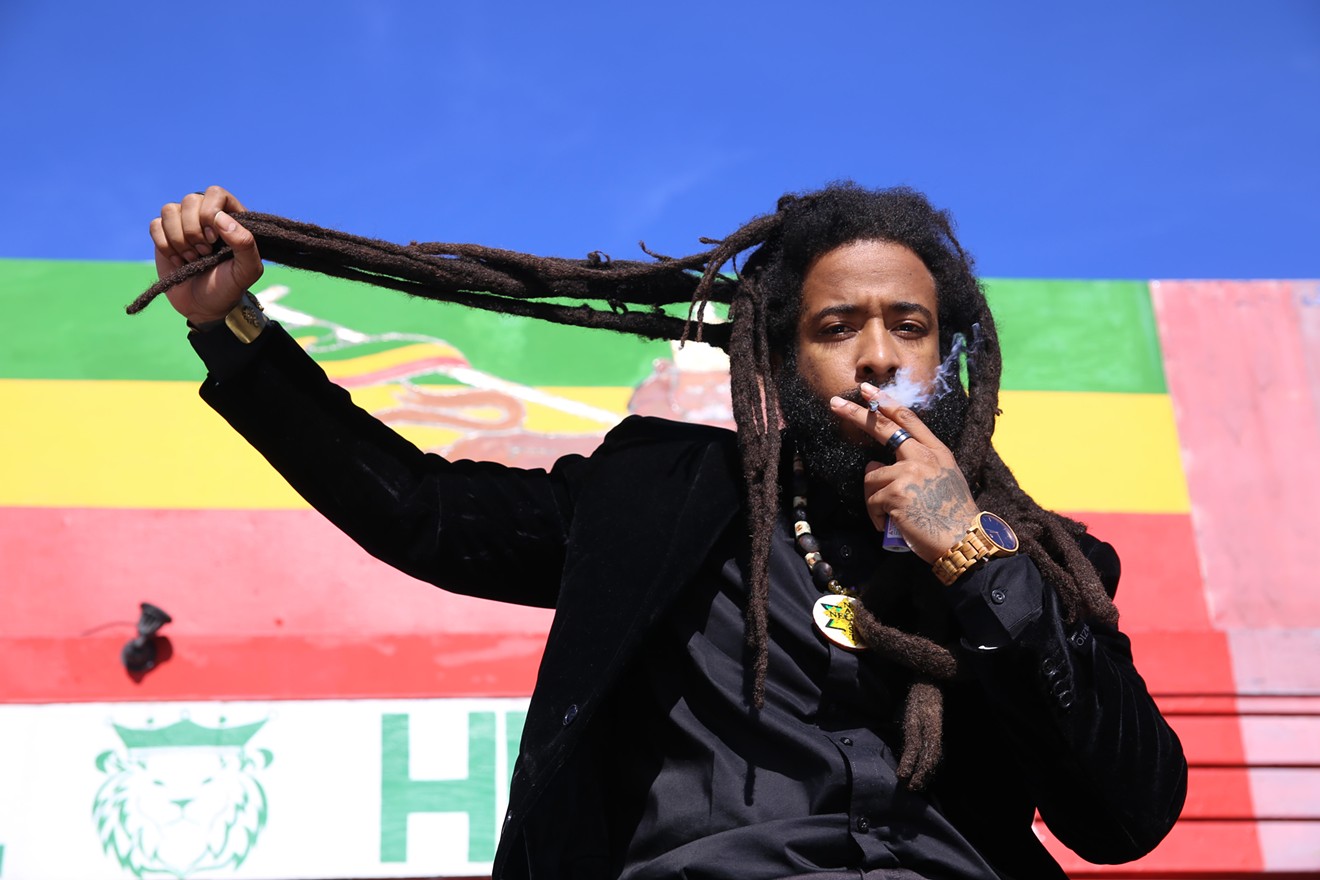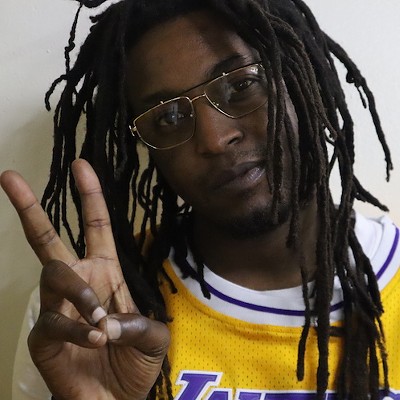The past may mold, but not define, an individual — and the Oak Cliff native and felon-turned-successful-business-owner is living the American dream in his hometown. For over five years, Judah has owned and operated Royal Hemps Pipes and Cultural Necessities, one of Dallas’ only African and Rastafarian culture shops.
“I’m actually from Dallas and the culture literally saved my life,” Judah says. “Took me in, even put me in business and I just really wanted to get that back out to the people.”
The exterior of Royal Hemps boasts the powerful red, gold and green Rastafari flag painted across the front that could be seen from across the street.
The energy that radiates from the face of the building draws in people who happen to catch a glimpse from the corner of their eye as they drive past. Judah says that people have pulled up to the store mistaking it for either a church or a Caribbean restaurant, while others didn’t know what it was but came in anyway.
The business, which Judah calls a "blessing," was never right in front of his face, but a seed was planted on a rainy day while on the yard of a federal prison in Oklahoma. This was before he found peace and started growing his dreadlocks longer than life itself.
“I was talking to a couple of my homeboys, and I had seen some guys walking out of the chapel, and it was probably about 12 of them with these long dreadlocks," he recalls. "Then it was almost like a burst of sun literally opened up over the top of these guys as they were walking back to their dorm.”
Judah remembers being stunned by how emotionally he reacted to their presence.
“I’ve never felt that way by just seeing a group of black men and I just asked my brethren, ‘Who are these guys?’” Judah says, recalling that first encounter with the Rastafarians, where he watched and studied them, even while they sat in the chow hall eating their cereal with water instead of milk.
“They had a certain level of peace about themselves even inside of this situation that I almost envied,” Judah remembers.
Judah dived headfirst into the Rasta culture when he was transferred to a different prison.
“I just spent the rest of my time there in the chapel just studying religion and studying culture,” he says.
When Judah was released in 2013, he headed to New Orleans. And 2017 marked the 29th straight year in which Louisiana led the country with the highest murder rate, according to the FBI’s 2017 Uniform Crime Reports data. Judah did everything he could to stay off the streets and found a sanctuary at the local head shop.
Next to it was a vape shop, where Judah worked his way up and which gave him his first taste in retail.
Eventually, Judah opened a smoke shop. But with the lease on the building ending, he soon found out that the landlord wouldn’t renew his lease on the building. He had two months to figure out where life would lead him. With felonies on his record, he knew he couldn’t realistically pursue a regular job.
“I was in and out of the system my whole life,” Judah says. “I think I’m here because this shit had to go right, even in my hardest moment I didn’t have no plan B.”
That was when Judah thought about coming back to Dallas. One thing that the Dallas he remembered lacked was unity among people of color. Judah thought that by opening his own culture shop in his hometown, he could help and influence the city in a positive way. Five years later, he's doing just what he set out to do.
Judah's shop carries a few smoke shop accessories like pipes and rolling papers, but Royal Hemps gets its character from the homemade oils and soap, with a wall full of more than 25 herbs used in holistic medicine practices.“I was in and out of the system my whole life. I think I’m here because this shit had to go right, even in my hardest moment I didn’t have no plan B.” — Judah
tweet this
“When we first opened, people weren’t embrace-ive of us,” Judah says. “All they could really see is the pipes and stuff, but I was trying to tell them that the pipes and the culture go together.”
Judah says it was important for him to carry items that relate to younger people because there's a misconception "that ghetto youth aren’t waking up" or that they enjoy self-destruction, but Judah said that’s not the case at all.
“You’ll be surprised. They come in here looking for blunt wraps and once they find out we don’t sell those, six months later they are buying incense and rolling papers," Judah says. "Just because they don’t initially move, act, think or start talking like you’re doing doesn’t mean they don’t get it or respect the culture.”
Judah knows that a lot of the young Oak Cliff residents that come in his store look to him as somebody they can genuinely trust and can learn from. He says that while he feels that most young people that grow up in inner-city neighborhoods aspire to be rappers or ball players, he wants young people to see that owning your own businesses and giving back to your community is cool too.
“I really feel like I’m up against rappers,” Judah says. “Until we make black-owned business cool and until we show them black-owned businesses [are] winning, the only thing the next generation is going to want to be is strippers and rappers because those are the only people they see being successful.”
Judah took a leap of faith when he opened Royal Hemps without a bank loan, advertising or an online store, but he had a vision and a purpose.
“To still be open after five years is just a blessing man,” he says. The support Judah receives from the community is manifested in love and energy that Royal Hemps releases back into the air of South Dallas.
“Doesn’t matter if you're better than somebody else at something,” Judah says. “But in certain business or music, you have to have the support of the people to be successful.”
The Royal Hemps brand is in the process of expanding as Judah has just purchased more retail space. Judah says he wants to continue to spread the importance of inclusion and culture throughout Dallas, while showing young Dallasites a legal and better path to success.
“Our main goal right now is to put about 20 to 25 ghetto youth in Dallas in a position to be their own business owners,” Judah says. He is on a mission to prove to the ghetto youth that they don’t have to wholesale drugs for a better life, but that there are legal commodities and other types of entrepreneurship ventures that could reap fruitful profits and benefits.
Judah could have easily grown content with the position he is in now, but he knows his work is not done. He is constantly active on social media growing the Royal Hemps brand and sending positive energy to those who need it. People of all ethnicities and races continue to tap in to the Rastafarian culture. A black business owner who grew up in a predominantly black neighborhood who is not selling drugs is a rare role model, but the ghetto youth have found that in Judah.












